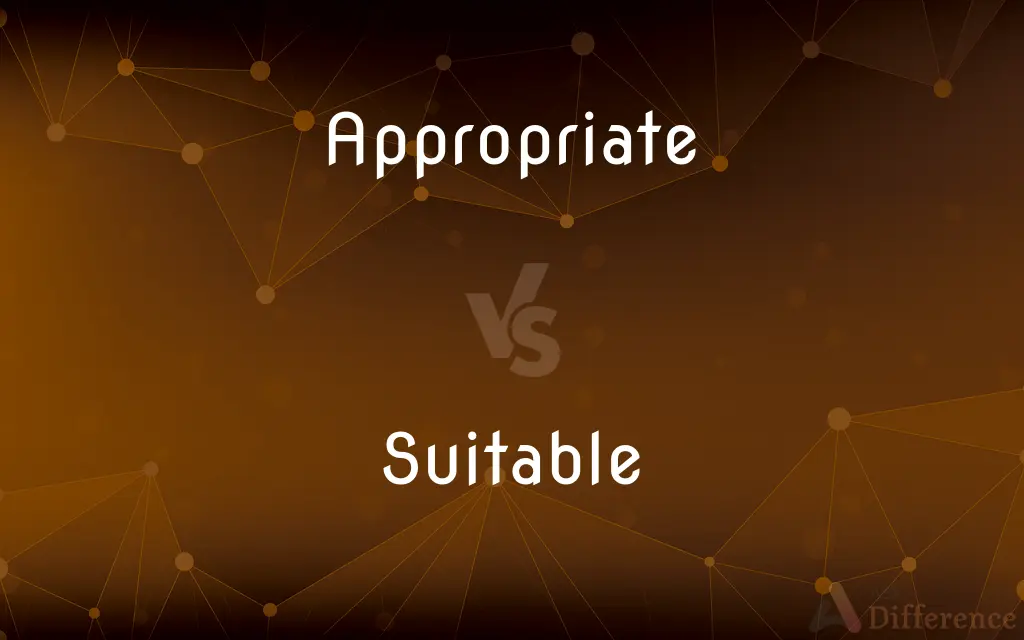Appropriate vs. Suitable — What's the Difference?
Edited by Tayyaba Rehman — By Maham Liaqat — Updated on April 25, 2024
"Appropriate" refers to something fitting or proper in a given context, often with a focus on decorum or ethics; "suitable" emphasizes compatibility or adequacy for a specific purpose or condition, focusing more on utility and function.

Difference Between Appropriate and Suitable
Table of Contents
ADVERTISEMENT
Key Differences
"Appropriate" implies a sense of correctness and suitability within ethical, social, or cultural norms, suggesting that something is not only fitting but also right and acceptable in a broader sense. On the other hand, "suitable" is typically used to denote that something meets the requirements or specifications for a particular task, purpose, or environment, without necessarily considering broader ethical implications.
In usage, "appropriate" often carries a moral or ethical judgment, used when discussing behavior, actions, or choices, particularly in social or professional settings. Conversely, "suitable" is more neutral and practical, used to describe objects, conditions, or selections based on their effectiveness or compatibility with a specific end.
For example, dress code decisions are often governed by what is "appropriate" for an occasion, which can include considerations of formality, respect, and convention. In contrast, when selecting equipment for a task, the focus is on what is "suitable," meaning what will best fulfill the functional requirements.
"Appropriate" is thus more subjective and can vary significantly based on cultural context or societal standards, while "suitable" tends to be more objective, based on clear criteria that define what makes something a good fit for a particular situation.
Although both terms imply a good match, "appropriate" often involves an element of judgment about social acceptance, whereas "suitable" focuses on practical utility and whether something fits a particular purpose without necessarily implying a value judgment.
ADVERTISEMENT
Comparison Chart
Definition
Fitting or proper within social or ethical norms.
Adequate or right for a particular purpose.
Focus
Ethics, decorum, cultural norms.
Utility, functionality, compatibility.
Usage Context
Behavior, choices, actions.
Objects, conditions, tools.
Implication
Moral or ethical suitability.
Practical or functional adequacy.
Subjectivity
Highly subjective and variable.
More objective, based on specific criteria.
Compare with Definitions
Appropriate
Reflecting good judgment.
Choosing to apologize was the appropriate action.
Suitable
Well-suited for a specific task or purpose.
This type of soil is suitable for growing tomatoes.
Appropriate
Proper in particular circumstances.
It’s appropriate to remain quiet in a library.
Suitable
Matching the requirements of a situation.
He found a suit suitable for the job interview.
Appropriate
Suitable in a moral or social sense.
Wearing formal attire to a wedding is considered appropriate.
Suitable
Right or acceptable for a particular need.
The weather was suitable for an outdoor event.
Appropriate
Matching accepted standards.
The teacher’s comments were appropriate for the student's age.
Suitable
Compatible with a specified condition.
The movie is suitable for all ages.
Appropriate
Socially or culturally accepted.
It is appropriate to bring a gift when you are invited to someone's home for dinner.
Suitable
Adequate for achieving a desired result.
They offered a price that was suitable for both parties.
Appropriate
Suitable for a particular person, condition, occasion, or place; fitting.
Suitable
Appropriate to a purpose or an occasion.
Appropriate
To set apart for a specific use
Appropriating funds for education.
Suitable
Having sufficient or the required properties for a certain purpose or task; appropriate to a certain occasion.
Appropriate
To take possession of or make use of exclusively for oneself, often without permission
My coworker appropriated my unread newspaper.
Suitable
Capable of suiting; fitting; accordant; proper; becoming; agreeable; adapted; as, ornaments suitable to one's station; language suitable for the subject.
Appropriate
Suitable or fit; proper.
The headmaster wondered what an appropriate measure would be to make the pupil behave better.
Suitable
Suitable for the desired purpose;
Is this a suitable dress for the office?
Appropriate
Suitable to the social situation or to social respect or social discreetness; socially correct; socially discreet; well-mannered; proper.
I don't think it was appropriate for the cashier to tell me out loud in front of all those people at the check-out that my hair-piece looked like it was falling out of place.
While it is not considered appropriate for a professor to date his student, there is no such concern once the semester has ended.
Suitable
Meant or adapted for an occasion or use;
A tractor suitable (or fit) for heavy duty
Not an appropriate (or fit) time for flippancy
Appropriate
(obsolete) Set apart for a particular use or person; reserved.
Suitable
Appropriate for a condition or occasion;
Everything in its proper place
The right man for the job
She is not suitable for the position
Appropriate
(transitive) To take to oneself; to claim or use, especially as by an exclusive right.
Let no man appropriate the use of a common benefit.
Suitable
Worthy of being chosen especially as a spouse;
The parents found the girl suitable for their son
Appropriate
(transitive) To set apart for, or assign to, a particular person or use, especially in exclusion of all others; with to or for.
A spot of ground is appropriated for a garden.
To appropriate money for the increase of the navy
Appropriate
To annex (for example a benefice, to a spiritual corporation, as its property).
Appropriate
To make suitable to; to suit.
Appropriate
Set apart for a particular use or person. Hence: Belonging peculiarly; peculiar; suitable; fit; proper.
In its strict and appropriate meaning.
Appropriate acts of divine worship.
It is not at all times easy to find words appropriate to express our ideas.
Appropriate
To take to one's self in exclusion of others; to claim or use as by an exclusive right; as, let no man appropriate the use of a common benefit.
Appropriate
To set apart for, or assign to, a particular person or use, in exclusion of all others; - with to or for; as, a spot of ground is appropriated for a garden; to appropriate money for the increase of the navy.
Appropriate
To make suitable; to suit.
Appropriate
To annex, as a benefice, to a spiritual corporation, as its property.
Appropriate
A property; attribute.
Appropriate
Give or assign a share of money or time to a particular person or cause;
I will earmark this money for your research
Appropriate
Take possession of by force, as after an invasion;
The invaders seized the land and property of the inhabitants
The army seized the town
The militia captured the castle
Appropriate
Suitable for a particular person or place or condition etc;
A book not appropriate for children
A funeral conducted the appropriate solemnity
It seems that an apology is appropriate
Appropriate
Appropriate for achieving a particular end; implies a lack of concern for fairness
Appropriate
Meant or adapted for an occasion or use;
A tractor suitable (or fit) for heavy duty
Not an appropriate (or fit) time for flippancy
Appropriate
Suitable and fitting;
The tailored clothes were harmonious with her military bearing
Appropriate
Being of striking appropriateness and pertinence;
The successful copywriter is a master of apposite and evocative verbal images
An apt reply
Common Curiosities
How do I determine if something is appropriate in a professional setting?
Consider the cultural, ethical, and professional standards and norms of the setting to determine appropriateness.
Why is it important to distinguish between appropriate and suitable?
Distinguishing between the two helps ensure that choices not only achieve desired practical outcomes but also uphold social and ethical standards.
Can the appropriateness of an action change over time?
Yes, what is considered appropriate can change as cultural and social norms evolve.
How does cultural context affect the determination of what is appropriate?
Cultural context plays a significant role in defining what is considered appropriate, as different cultures have varying norms and values.
What makes something appropriate rather than just suitable?
Something is appropriate when it not only fits the situation but also conforms to social, ethical, or cultural expectations.
Can something be suitable but not appropriate?
Yes, something can be suitable, or adequate, for a purpose but still not be appropriate if it violates social norms or expectations.
How do business professionals decide if a decision is appropriate?
They consider the ethical implications, company policy, and potential impact on stakeholders and reputation.
How do societal norms influence the concept of appropriateness?
Societal norms define what behaviors and actions are considered acceptable and expected within a community.
What are key factors in determining the suitability of a tool or method?
Key factors include the tool’s or method’s efficiency, compatibility with the task, and ability to meet the desired outcome effectively.
What role does appropriateness play in social media use?
Appropriateness in social media involves considering the public and potentially global audience, cultural sensitivity, and the permanence of online posts.
Why might suitability be prioritized in emergency situations?
In emergencies, the immediate suitability of actions or tools to address the crisis effectively is often more critical than their broader social appropriateness.
Is suitability more important than appropriateness in technical fields?
In technical fields, suitability often takes precedence, focusing on functionality and effectiveness, though appropriateness can still be relevant in interpersonal aspects.
What is an example of something being suitable but inappropriate?
Wearing a casual outfit may be suitable for comfort but inappropriate for a formal business meeting.
How can educators ensure materials are both appropriate and suitable?
Educators need to choose materials that not only cover the curriculum effectively (suitable) but also consider the age, cultural background, and sensitivity of their students (appropriate).
What considerations should be made when choosing appropriate attire for an event?
Considerations should include the event’s formality, cultural expectations, and specific guidelines or themes provided by the hosts.
Share Your Discovery

Previous Comparison
Require vs. Request
Next Comparison
Characteristic vs. PersonalityAuthor Spotlight
Written by
Maham LiaqatEdited by
Tayyaba RehmanTayyaba Rehman is a distinguished writer, currently serving as a primary contributor to askdifference.com. As a researcher in semantics and etymology, Tayyaba's passion for the complexity of languages and their distinctions has found a perfect home on the platform. Tayyaba delves into the intricacies of language, distinguishing between commonly confused words and phrases, thereby providing clarity for readers worldwide.
















































